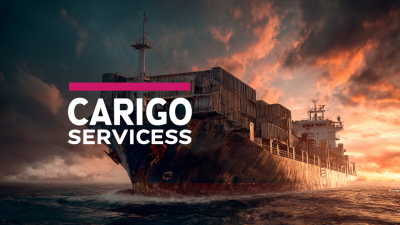 In today's fast-paced global economy, optimizing cargo services is essential for businesses looking to enhance their operational efficiency and reduce costs. As trade continues to expand across borders, the demand for reliable and effective cargo solutions has never been higher. By leveraging innovative strategies and technologies, companies can streamline their logistics processes, ensuring that goods are transported swiftly and safely.
In today's fast-paced global economy, optimizing cargo services is essential for businesses looking to enhance their operational efficiency and reduce costs. As trade continues to expand across borders, the demand for reliable and effective cargo solutions has never been higher. By leveraging innovative strategies and technologies, companies can streamline their logistics processes, ensuring that goods are transported swiftly and safely.
This blog will explore key tips on how to maximize the efficiency of cargo services, from adopting digital tools to improving communication with logistics partners. By implementing these best practices, businesses can not only cut expenses but also improve service delivery, ultimately gaining a competitive edge in the ever-evolving marketplace.
Join us as we delve into actionable strategies that will transform your cargo operations and drive sustainable growth.
When optimizing cargo services, understanding efficiency metrics is crucial for driving optimal performance. Key performance indicators (KPIs) such as transit time, cargo damage rates, and cost per shipment provide actionable insights into the effectiveness of your operations. By closely monitoring these metrics, businesses can identify areas for improvement, streamline processes, and ultimately enhance service delivery. For example, a high transit time may signal bottlenecks in logistics, prompting a re-evaluation of routes or carrier partnerships.

Additionally, utilizing technology can significantly bolster cargo service efficiency. Implementing tracking systems and automated reporting tools allows for real-time visibility and quick adjustments based on performance data. By adopting data-driven approaches, companies can reduce operational costs and ensure timely deliveries, which are essential for maintaining customer satisfaction. Regular reviews of efficiency metrics can lead to more informed decision-making and foster a culture of continuous improvement within the organization.
In the ever-evolving logistics landscape, optimizing cargo services is essential for achieving maximum efficiency and cost-effectiveness. By leveraging technology, businesses can streamline their cargo operations, significantly reducing unnecessary expenditures. Advanced tools like artificial intelligence and cloud computing are revolutionizing how supply chain managers and logistics operators engage with their processes.
 Tip 1: Implement AI solutions to enhance decision-making in logistics. AI can analyze vast amounts of data to predict demand fluctuations and optimize routes. For example, automated systems are being utilized to manage load tendering processes, allowing shippers to respond swiftly to market changes.
Tip 1: Implement AI solutions to enhance decision-making in logistics. AI can analyze vast amounts of data to predict demand fluctuations and optimize routes. For example, automated systems are being utilized to manage load tendering processes, allowing shippers to respond swiftly to market changes.
Tip 2: Embrace automation in your cargo handling procedures. Innovations such as IoT sensors and blockchain technology are streamlining port operations and enhancing communication across the supply chain. By integrating these technologies, logistics providers can improve transparency, reduce delays, and ultimately lower costs.
By adopting these technologies, companies can not only stay competitive but also achieve sustainable growth in a rapidly changing market.
In the ever-evolving landscape of cargo services, leveraging data analytics has emerged as a game-changer for businesses aiming for operational excellence. By collecting and analyzing vast amounts of data, companies can gain valuable insights into shipping routes, delivery times, and customer preferences. This data-driven approach facilitates smarter decision-making, allowing logistics managers to assess performance metrics and anticipate potential disruptions, which ultimately fosters greater efficiency in cargo operations.
Moreover, data analytics can optimize pricing strategies and resource allocation. By examining historical shipping data and current market trends, companies can adjust their rates dynamically and allocate resources where they are most needed. This agility not only minimizes costs but also enhances customer satisfaction through improved service delivery. Consequently, organizations that embrace data analytics are well-positioned to stay ahead of the competition, ensuring that every decision made in cargo services is informed, strategic, and aligned with overall business goals.
| Service Type | Average Cost ($) | Transit Time (Days) | Cargo Volume (CBM) | Data Utilization (%) |
|---|---|---|---|---|
| Air Freight | 1500 | 3 | 30 | 80 |
| Sea Freight | 800 | 14 | 50 | 60 |
| Rail Freight | 1000 | 8 | 40 | 70 |
| Road Freight | 600 | 5 | 25 | 50 |
Effective inventory management is essential for optimizing cargo services, enhancing efficiency, and turning cost into savings. According to the 2022 Logistics and Supply Chain Benchmark Report, companies that implemented advanced inventory management practices reported a 15% reduction in operational costs. These practices include real-time tracking and automated inventory systems, which minimize human error and improve accuracy in stock levels.
One of the best practices for inventory management is to adopt just-in-time (JIT) inventory systems, which reduce excess stock and decrease holding costs. Research shows that businesses leveraging JIT methodologies can lower their inventory carrying costs by up to 30%. Additionally, utilizing predictive analytics can help cargo services forecast demand more accurately, allowing them to adjust inventory levels proactively. According to a study by Gartner, companies that deploy predictive analytics in their operations experience a 20% increase in order fulfillment rates, significantly improving overall customer satisfaction.
Furthermore, investing in a robust warehouse management system (WMS) can streamline operations by automating key functions such as picking, packing, and shipping. A report by Supply Chain 24/7 found that businesses using advanced WMS solutions see improved inventory turnover rates by up to 40%, enabling them to respond more swiftly to market changes and customer demands. By implementing these best practices, cargo services can not only enhance their efficiency but also significantly cut costs, providing a competitive edge in a rapidly evolving industry.
Effective communication and coordination are pivotal in optimizing cargo services for enhanced efficiency and cost-effectiveness. To achieve this, implementing integrated communication platforms can bridge the information gap between various stakeholders, including shippers, carriers, and clients. Utilizing tools such as real-time tracking systems ensures that everyone involved has access to up-to-date information regarding shipment status, thereby reducing misunderstandings and delays. Furthermore, regular meetings and briefings can help in identifying potential challenges early on, allowing teams to devise prompt solutions.
Fostering a culture of collaboration within logistics operations can significantly streamline processes. By encouraging open dialogue among team members, organizations can harness diverse insights and suggestions that drive innovation. Establishing clear roles and responsibilities is also crucial; it eliminates confusion and empowers employees to take initiative. Training programs focused on enhancing interpersonal skills can further contribute to building strong relationships, enhancing overall performance, and minimizing errors in cargo management. By prioritizing effective communication and coordination, companies can ensure seamless logistics operations that not only save costs but also enhance customer satisfaction.












